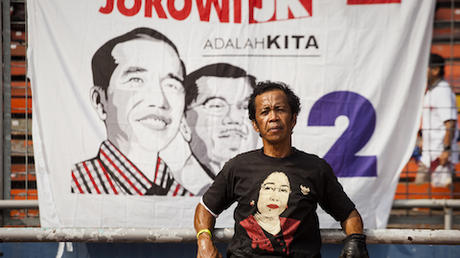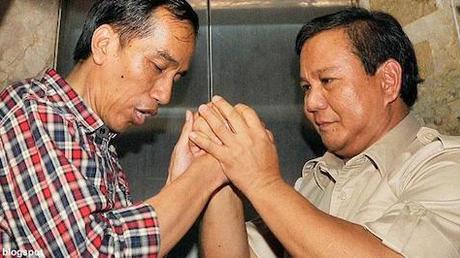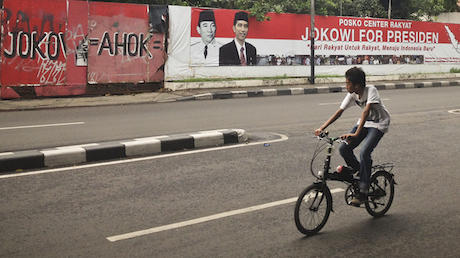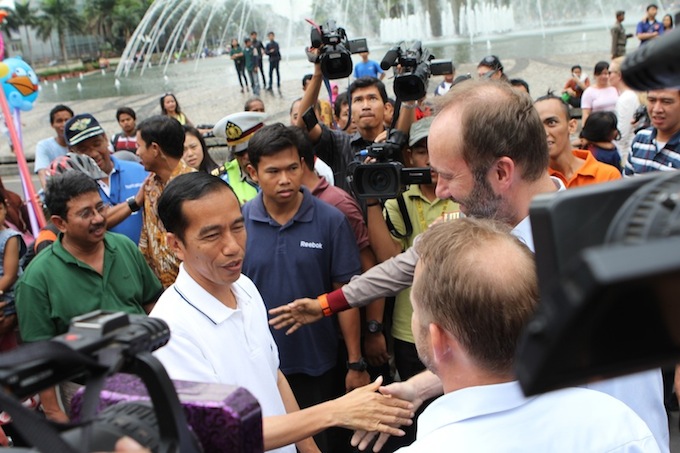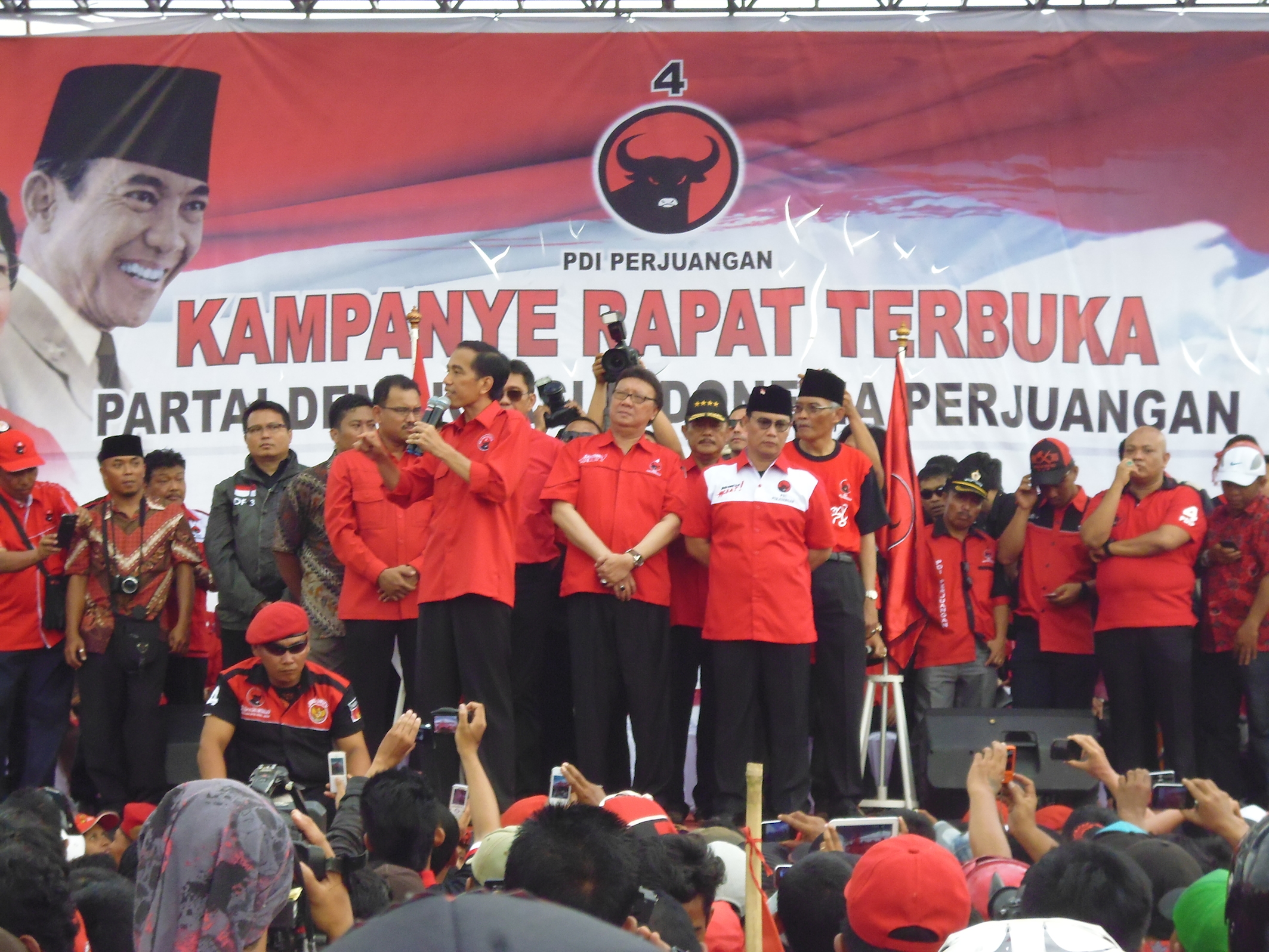After a frenzied, intense three weeks, Indonesia's legislative election campaign wound up on Saturday.
Streets were blanketed with candidate’s posters and the airwaves saturated with political advertising, along with all the inevitable promises and inducements. Campaign activities have ranged from the ritual set-piece party extravaganzas to individual candidates going door-to-door or spruiking to small community meetings.
Of the 12 national parties contesting the polls most would, however, have been worried by two polls released late last week, each suggesting that despite the parties best efforts the campaign had done little to influence voter preferences.
Each survey – fielded by Saiful Mujani Research and Consulting and Indikator respectively – found that only the Indonesian Democratic Struggle Party (PDI-P) had increased its support by more than the poll's margin of error during the opening weeks of campaigning. PDI-P, which has remained in opposition for both of President Yudhoyono's terms, already had the highest level of support. These new polls suggest it has moved further ahead.
Polling Results for National Legislature Ahead of Indonesian Legislative Elections - Select Parties
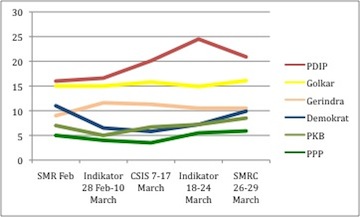
(NB: Of the six parties not shown in this graph, four achieved support ranging from 3 - 7 % (Hanura, Nasdem, PKS, PAN) in these polls, whereas tow other parties received around 1% or less of the vote (PBB, PKPI), which would place them below the 3.5% parliamentary threshold. Some numbers rounded to whole numbers by the polling institutes.)
PDI-P's main point of difference is the immensely popular "man of the people" Jakarta governor Joko Widodo (ubiquitously known as Jokowi), who was finally confirmed as PDI-P's presidential candidate on 14 March - just two days before the campaign proper started. Such is Jokowi's prominence in Indonesian politics that the term "Jokowi effect" has broad currency.
PDI-P has run much of its campaign on the premise that a vote for PDI-P is a vote for Jokowi as President (although its TV spots did not follow this template until late in the campaign). The party's posters exhort voters to choose the party to "Take Jokowi to be President".
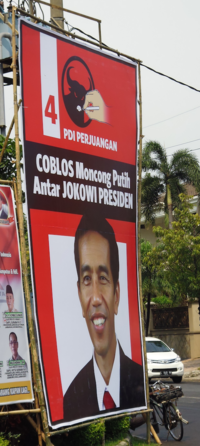
When I watched Jokowi campaign in Malang in East Java he called for PDI-P to win convincingly to smooth the way for July's presidential election, and so that he has strong parliamentary support to be a strong president, rather than citing any particular virtue of the party itself.
Many individual PDI-P candidates have also sought to benefit personally from Jokowi's star power, featuring images of him shaking hands with them or hovering in the top corner of their campaign posters, or in at least one case, replacing their photo altogether.
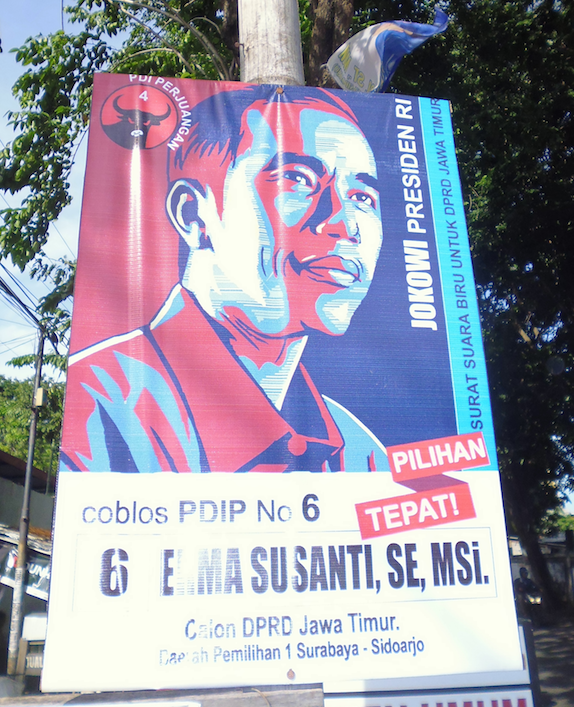
PDI-P's closest rivals have followed similar strategies, placing their leading figures front and centre in their campaigns. These other parties face the twin challenge of lower underlying support prior to the campaign period and less popular presidential candidates. Jokowi's main rival for president, the former general and former Suharto son-in-law Prabowo Subianto, features on posters for his Greater Indonesia Movement Party (Gerindra) with the slogan "Gerindra Wins, Prabowo [becomes] President".
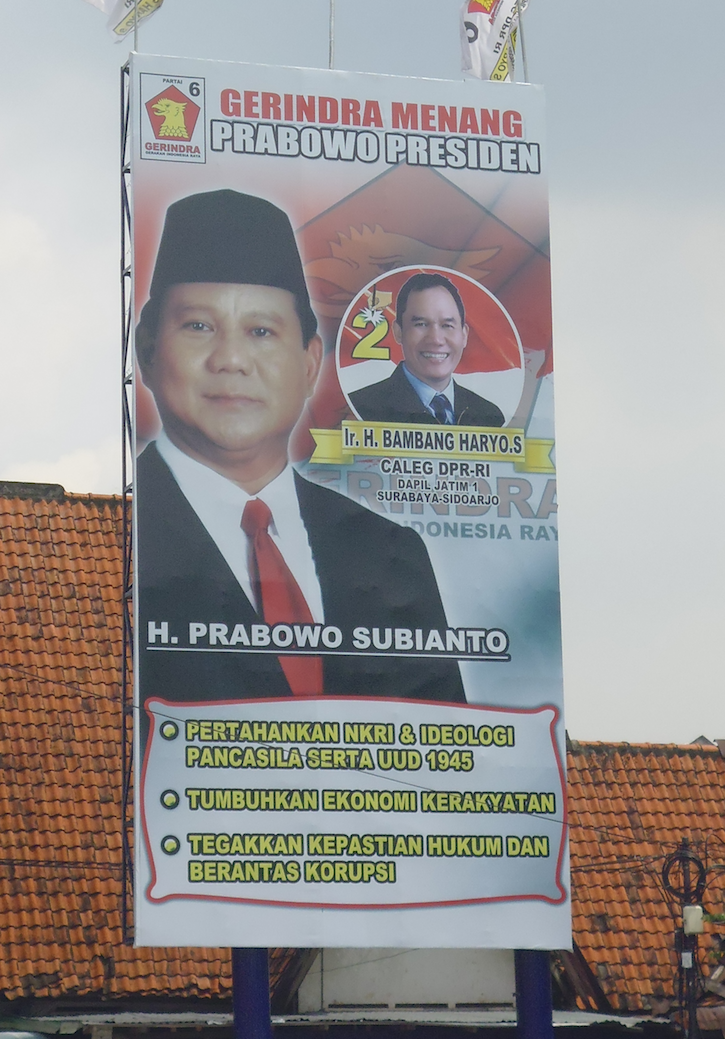
Prabowo has trailed Jokowi convincingly in reputable polls for at least a year though, and the latest SMRC and Indikator polls each showed him to have fallen further behind. Interestingly, Jokowi achieved this increase in support despite the Indikator poll finding 29% of voters were not even aware that PDI-P had confirmed him as their presidential candidate.
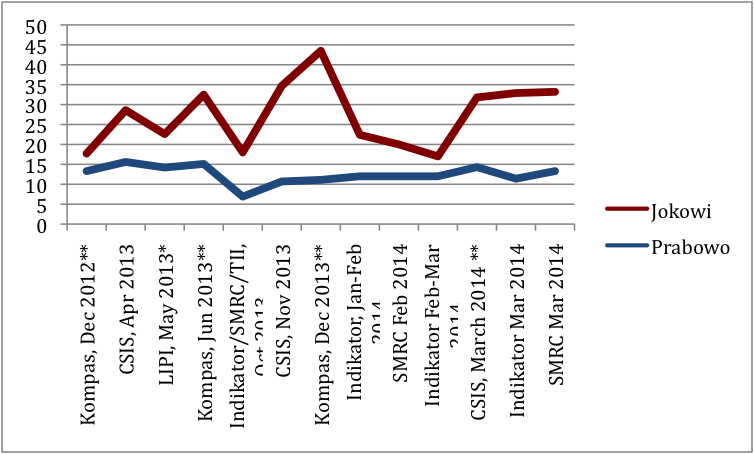
(NB: * This LIPI poll and the CSIS poll presented respondents with a field of candidates to choose from. ** The Kompas poll uses same respondents for each iteration, unclear whether top of mind or a field of candidates.)
Prabowo's problem in trying to catch up is that the qualities voters identify as most important for a president are Jokowi's trademarks, not his. The Indikator survey found the most voters identified honest/trustworthy (46.5%) and attention to the people (29.5%) as the single most important quality for a president. PDI-P evidently knows this well - at the PDI-P rally I mentioned above, other speakers emphasised repeatedly that Jokowi was honest, a man of the people and lived simply.
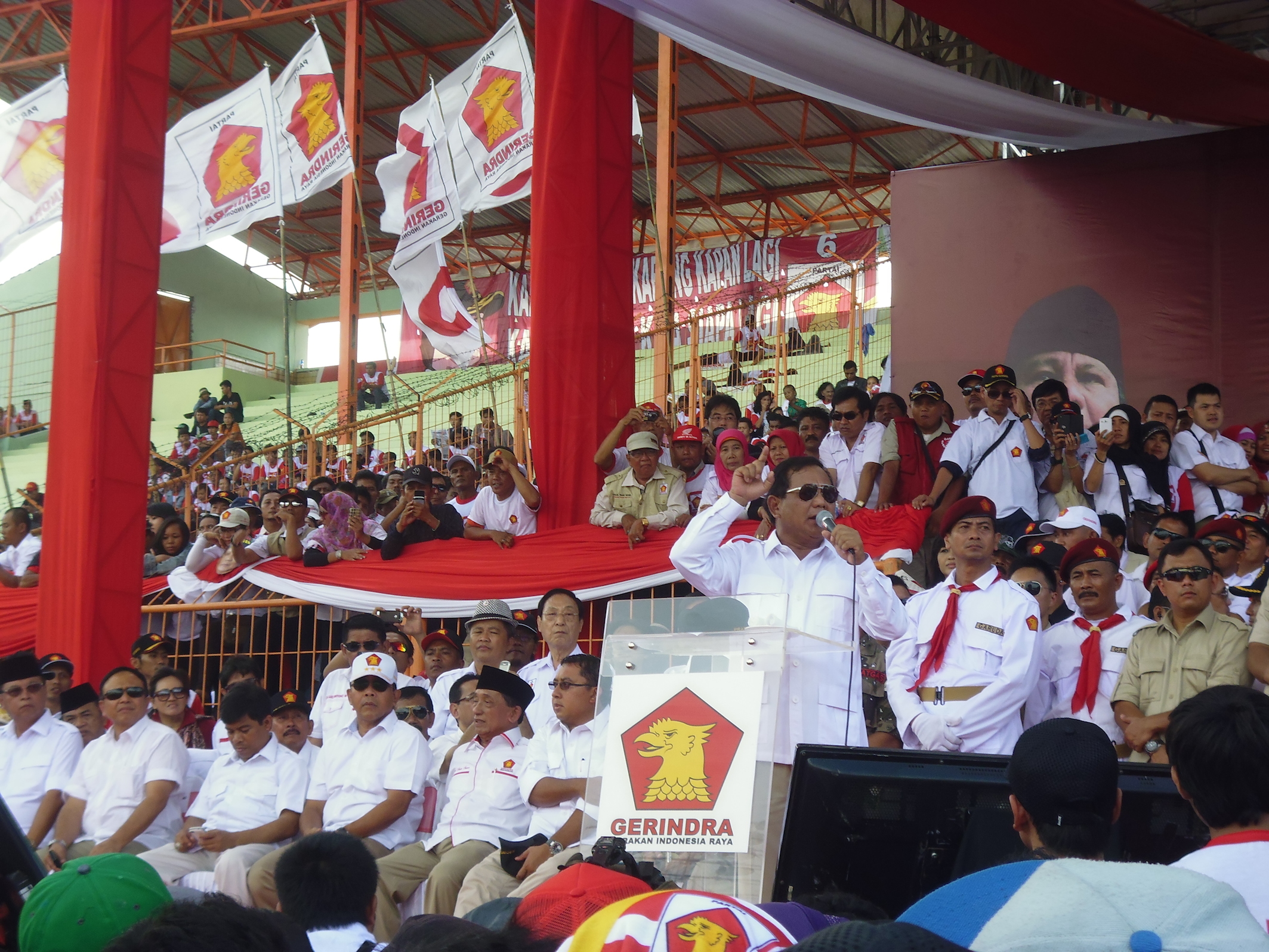
Jokowi's detractors cite his inexperience, but ‘ability to lead’ came only a distant third (11.6%) in the list of most important qualities. (His meteoric rise from small town mayor means Jokowi has been Jakarta governor only for 18 months and he has never held a national-level political position.)
One of the most interesting sub-sets of results from these polls concerned the reach of parties' and individual candidates' campaigns. SMRC found 8.9% of voters had been contacted by parties or campaign teams in person, by phone or by SMS; 8% had taken part directly in campaign rallies or meetings, in some cases for more than one party, whereas most recalled seeing party ads on television. SMRC concluded though that there was no clear correlation between these campaign activities and support for each party.
The time for ads has now passed though, as the three days prior to Wednesday's vote are designated a cooling down period. Come Wednesday the immediate priority for observers will be the parties' overall vote tallies and seat allocations (Tom Pepinsky provides a helpful chart of previous legislatures here). To enter the national legislature parties require 3.5 % of votes; to nominate a presidential candidate parties or coalitions must attain 20 percent of seats in the national legislature or 25 percent of valid votes.
Individual candidates though will be watching their own vote tallies, regardless of how well their parties perform. In Indonesia's open list system with multi-seat electorates, the party's seats go to whichever of its candidates get the most votes. The strategies candidates have adopted to stand out from the crowd have varied widely - Wednesday will show who chose the right formula.
Dave McRae is a Senior Research Fellow in the Asia Institute at the University of Melbourne. For his overview of Indonesian politics heading into the election year, click here.


